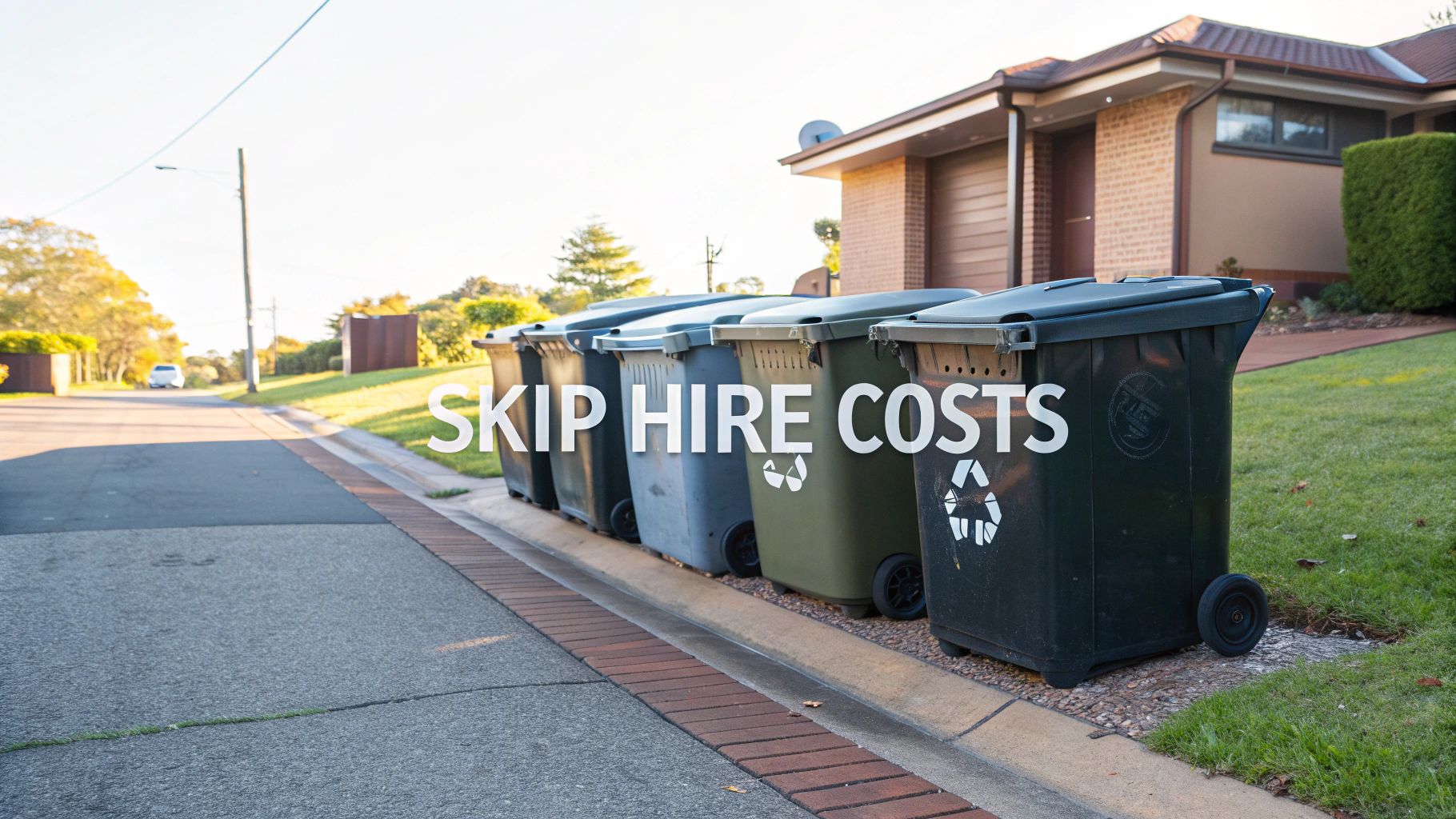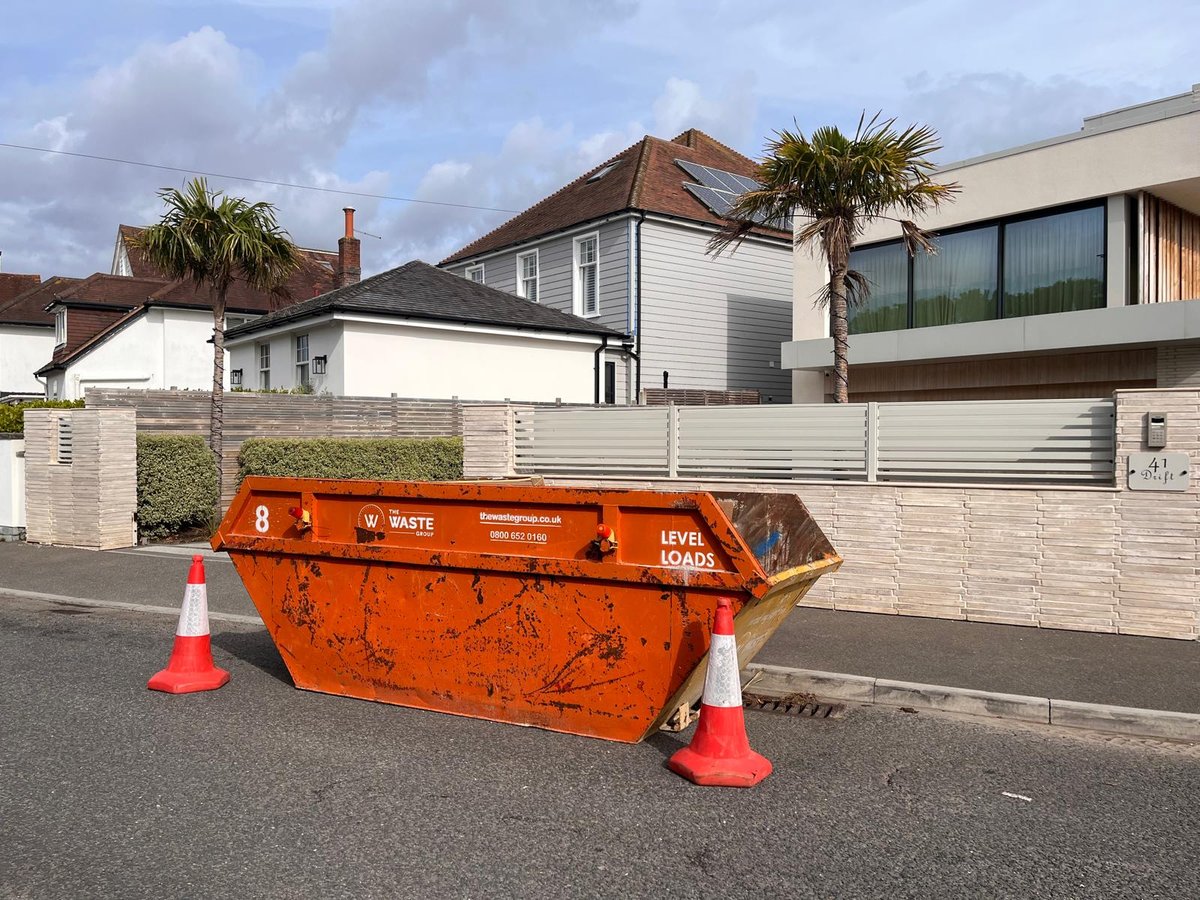Find Commercial Waste Collection Near Me | Reliable Local Service
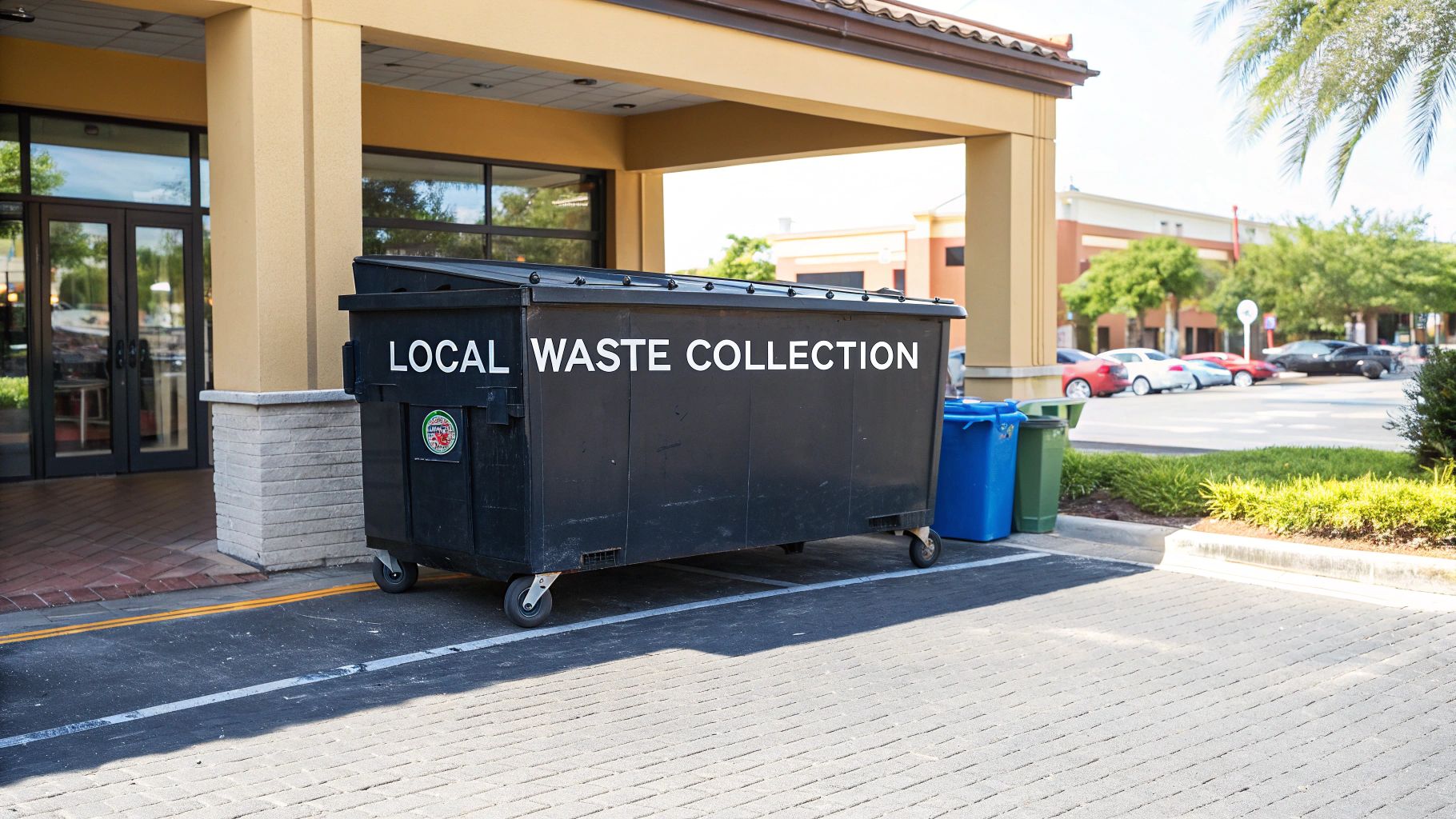
Find Commercial Waste Collection Near Me | Reliable Local Service
Typing ‘commercial waste collection near me’ into a search engine is the easy part. The real task is finding a genuine partner for your business – someone who understands that waste management isn’t just about bin lorries, but about keeping your operations smooth and compliant.
A great local service is more than a vendor; they’re a strategic asset. They keep your premises clean and ensure you’re ticking all the right regulatory boxes, all without getting in your way.
Why The Right Local Waste Partner Is A Game Changer
Let’s be clear: choosing your waste collection provider is a key business decision, not just another task to tick off the list. The right local company does so much more than empty your bins. They become an extension of your team, helping you navigate complex UK regulations and even boosting your brand’s green credentials.
This proactive partnership helps you sidestep the common headaches, like surprise charges on your invoice or, worse, unreliable pickups that can bring your business to a halt.
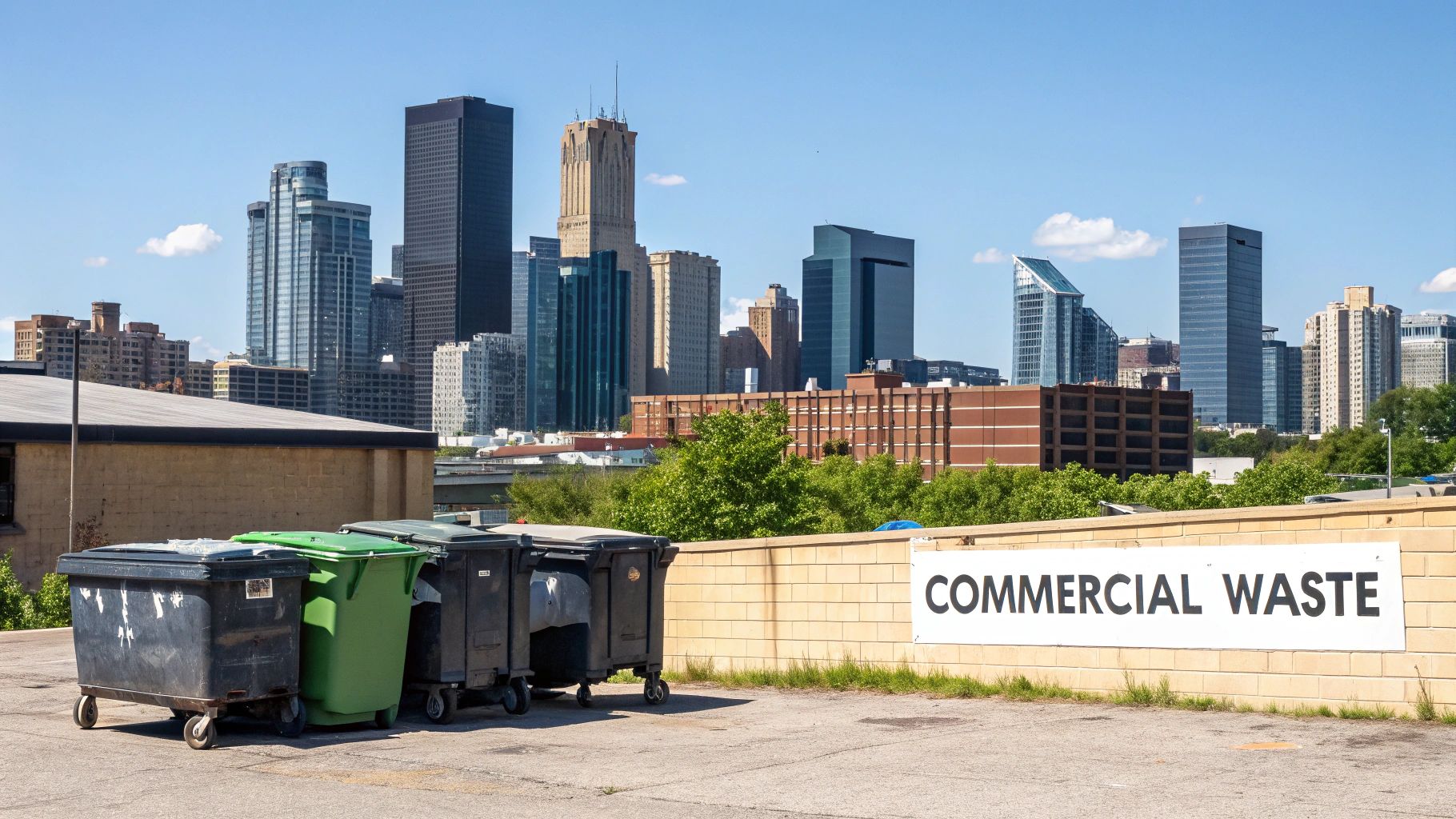
It’s an especially crucial choice given the UK’s growing waste management industry. The sector was valued at USD 40.22 billion in 2024 and is forecast to hit USD 66.24 billion by 2033. This growth is fuelled by stricter recycling laws and a much bigger focus on corporate sustainability.
It’s a Strategic Business Decision
A dependable local partner is the secret to keeping your business running without waste-related drama.
Imagine a restaurant missing its food waste collection during a summer heatwave. It’s an instant recipe for hygiene issues and a damaged reputation. A proactive provider sees that coming. They offer flexible schedules and clear communication to make sure it never happens.
A great waste management partner doesn’t just solve problems—they prevent them. This proactive approach protects your bottom line, keeps your operations compliant, and frees you up to focus on running your business.
Integrating Waste Management Effectively
To really see the “game-changing” impact, think about how waste fits into your bigger picture. An efficient waste plan is a cornerstone of a well-maintained site, just like the other items on a commercial building maintenance checklist.
It directly affects everything from site safety to your company’s public image. A top-tier provider gets this connection and works with you to manage your waste seamlessly.
Conducting A Practical Business Waste Audit
Before you even think about searching for “commercial waste collection near me,” you need to get a clear picture of what you’re actually throwing away. This isn’t about creating complex spreadsheets; it’s about taking a simple, practical look inside your bins. A quick audit will help you identify your main waste streams, whether that’s general rubbish, mixed recycling, food, or even hazardous materials.
This first step is crucial. The UK’s commercial and industrial sectors generated roughly 40.4 million tonnes of waste back in 2020, and businesses just like yours were responsible for the majority of it. To manage your slice of the pie effectively, you have to know what you’re producing.
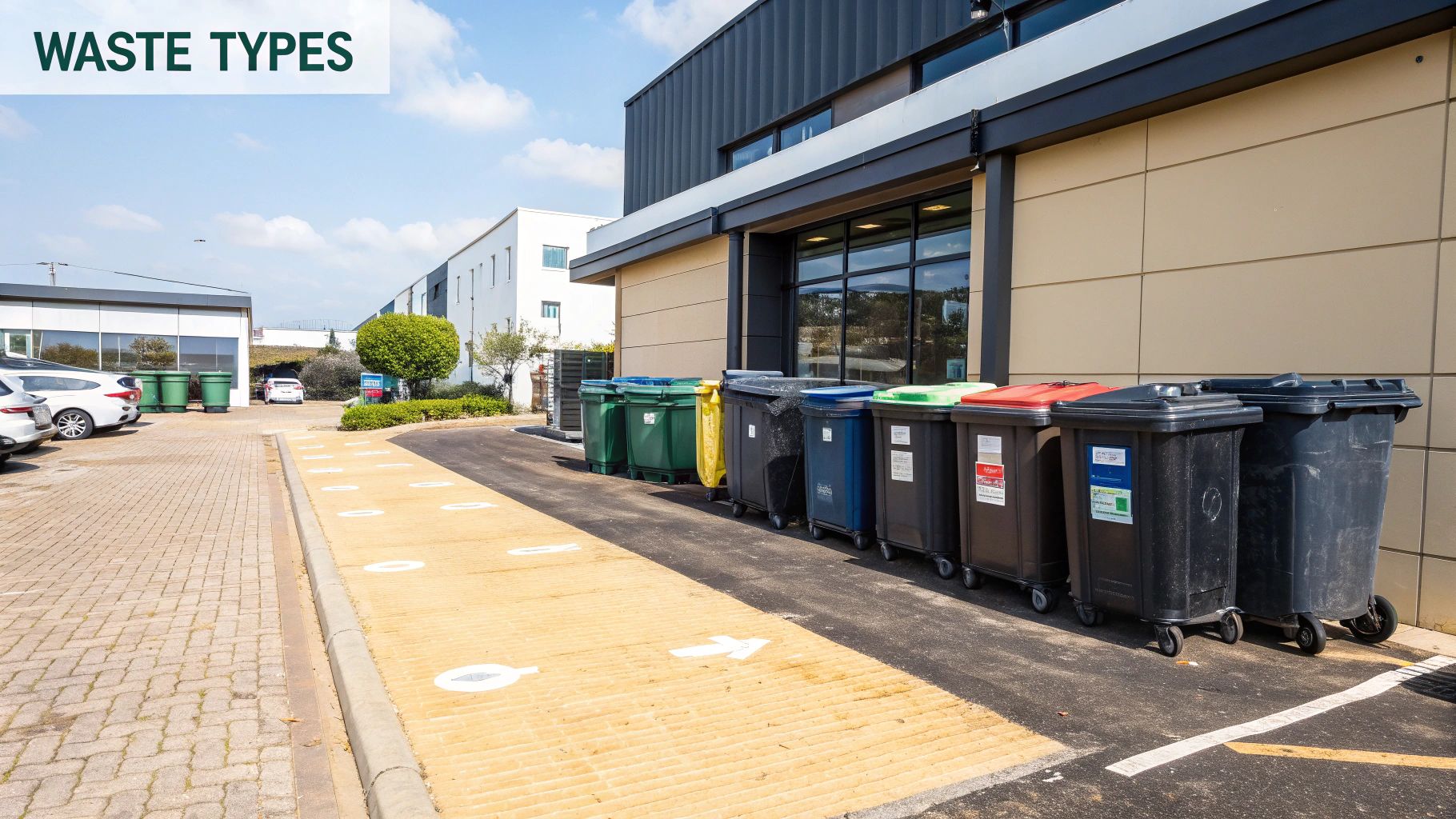
Identifying Your Primary Waste Streams
Just think about your day-to-day operations for a moment. A small café’s audit will probably show mostly food scraps, coffee grounds, and packaging. A retail shop, on the other hand, is going to see a mountain of cardboard and plastic film.
By getting a handle on what you throw out, you can get much more precise quotes and choose the right bin sizes. This simple bit of homework stops you from overpaying for a service you don’t really need or, just as bad, having to call for emergency collections because your bins are overflowing again.
A waste audit is your first step towards cost control. Knowing exactly what and how much you dispose of gives you the power to negotiate a fair, accurate service contract that fits your business perfectly.
While you’re at it, it’s worth considering how effective business storage solutions could help. Properly managing your inventory and assets can reduce clutter and minimise what ends up in the bin in the first place.
This initial assessment also gives you a baseline for improving your environmental performance. When you know your high-volume waste types, you can target specific areas for reduction and recycling. It’s a key principle you can learn more about in our guide to the circular economy in waste management. This proactive approach doesn’t just cut your costs; it also strengthens your company’s green credentials.
Staying Compliant With UK Waste Regulations
Getting your head around UK waste law is a non-negotiable part of running a business, but it doesn’t have to feel intimidating. The rules are simply there to make sure all waste is handled safely and responsibly, which protects both the environment and public health. For your business, this responsibility is wrapped up in a legal concept known as the ‘Duty of Care’.
This duty means you are legally on the hook for your business waste from the moment you create it until it’s properly disposed of by a licensed carrier. This is where a crucial piece of paperwork comes into play.
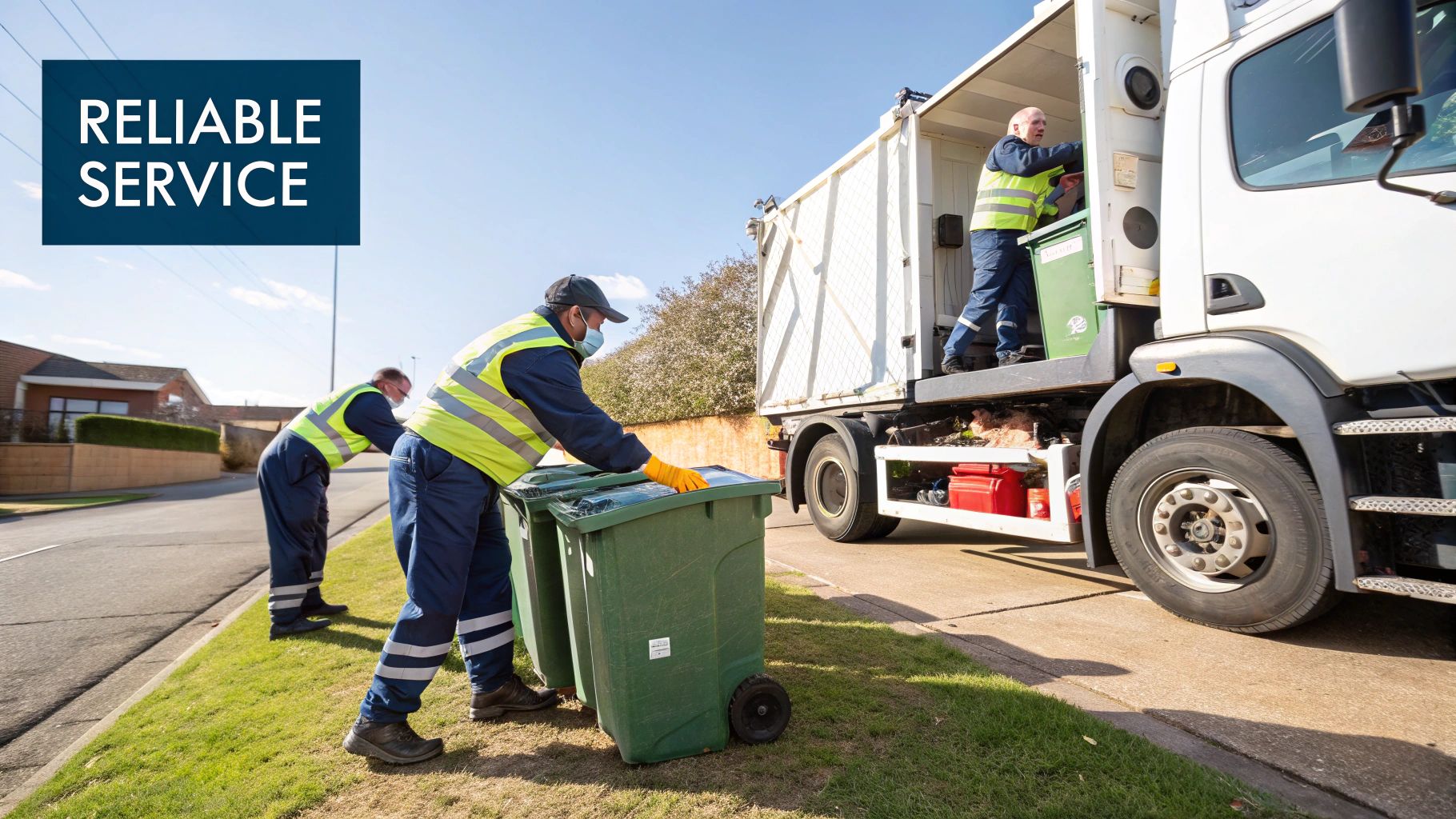
Your Legal Proof: The Waste Transfer Note
Every single time your commercial waste is collected, you must get a Waste Transfer Note (WTN). Think of this document as far more than just a receipt; it’s your legal proof that you’ve handed your waste over to a legitimate, authorised company.
You’re required to keep copies of your WTNs for a minimum of two years. If an inspector calls and you can’t produce them, you could be facing some hefty fines. It’s a simple but absolutely critical step in proving your business is playing by the rules. Any professional searching for “commercial waste collection near me” should make sure their chosen provider makes this process seamless.
Your Waste Transfer Note is your shield. It officially documents that your business has fulfilled its Duty of Care, transferring responsibility to a licensed professional for final disposal and treatment.
Getting Ready for Simpler Recycling Rules
Regulations are always evolving, especially to encourage more recycling. One of the biggest upcoming changes is the ‘Simpler Recycling’ legislation, which kicks in from 31 March 2025. If you’re a business in England with 10 or more full-time employees, this will require you to separate your waste at the source into specific streams.
The required categories will be:
- Food waste
- Paper and cardboard
- All other dry recyclables (like plastic, metal, and glass)
This change means that having well-organised waste streams will no longer just be good practice—it’ll be a legal must-have. You can find out more about these 2025 waste management changes to get your business fully prepared.
Setting up your collection service correctly now means you’ll be operating with confidence when the new rules arrive.
Finding And Vetting Local Waste Services
Right, you’ve got a solid handle on your waste streams. Now the real work begins: finding a reliable local partner to take it all away. Going beyond a quick “commercial waste collection near me” search is absolutely crucial if you want to avoid headaches later on.
Start by digging into local business directories and checking your council’s list of recommended suppliers. Even better, ask the business next door who they use. There’s nothing more valuable than a real-world recommendation. Hearing firsthand about prompt collections and no-nonsense billing tells you far more than a glossy website ever will.
Once you have a shortlist of three or four potential companies, it’s time to vet them properly.
Checking Credentials and Asking the Right Questions
Before you even think about getting a quote, do this one non-negotiable check: make sure they are a registered waste carrier. Every legitimate operator in the UK must be registered with the Environment Agency. You can easily verify a company’s licence on the official government register. If they aren’t on there, cross them off your list immediately. No exceptions.
Once you’ve confirmed they’re legit, you can start digging into the details. Don’t be shy about asking direct questions that reveal how they actually operate.
Thinking about it visually can really help. A simple decision tree, for example, can clarify which service level makes the most sense based on your business size, collection frequency, and budget.
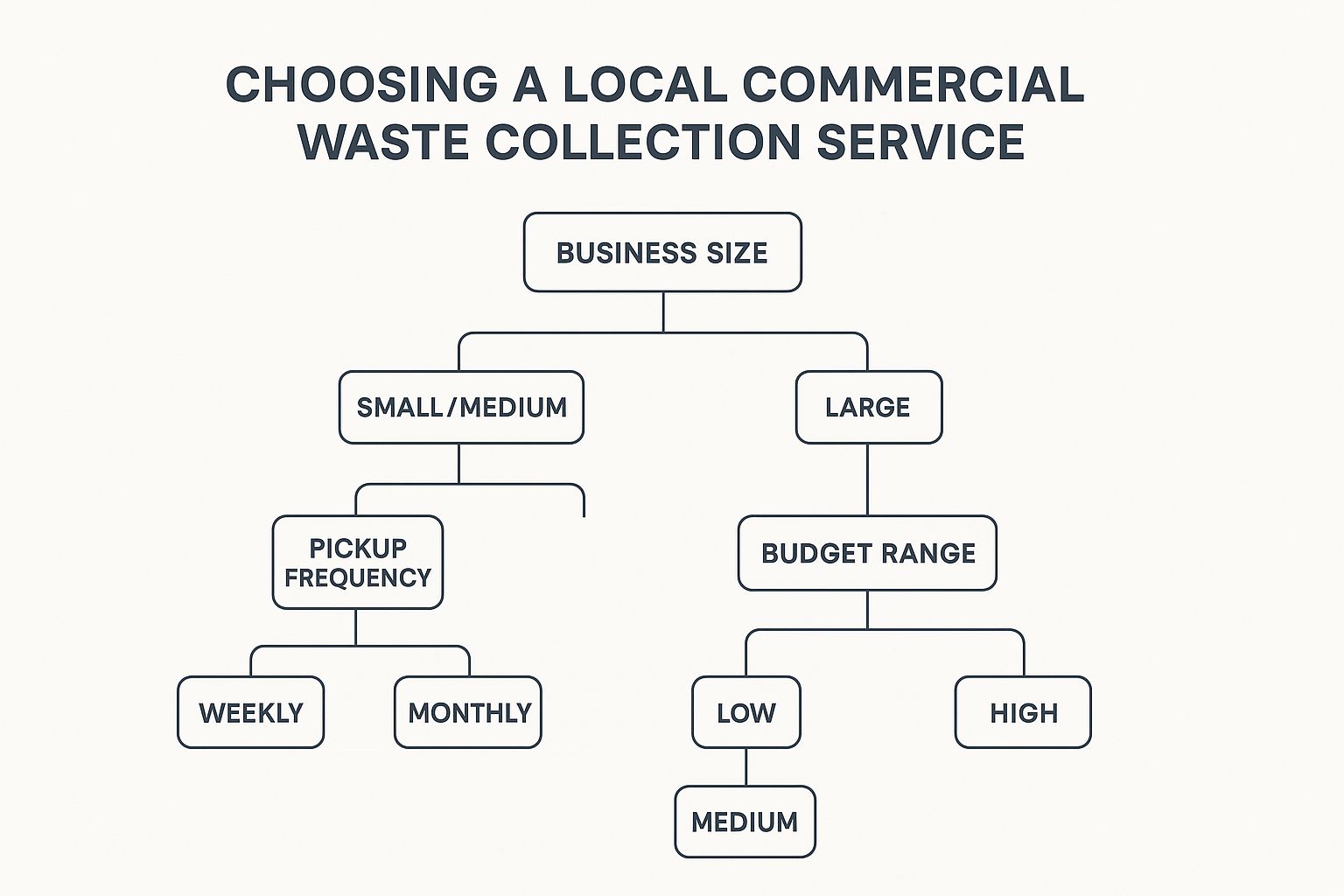
This kind of approach helps you see exactly how your specific needs should guide your choice.
Here are some of the essential questions I always recommend asking potential providers:
- Contract Terms: What’s the minimum contract length? And what are the terms if I need to cancel or change my service?
- Bin Provision: Are the bins included, or is there a separate rental fee? This can be a sneaky hidden cost.
- Weight Limits: Do you have excess weight charges? If so, how are they calculated?
- Recycling Process: What percentage of the waste you collect is actually recycled versus sent to landfill? Get specifics.
- Customer Support: If a collection is missed or I have a billing question, who do I talk to? Is it a call centre or a dedicated account manager?
Getting straight answers to these questions is fundamental. A transparent, reputable provider will have no issue explaining their processes. This is how you compare quotes on a true like-for-like basis and avoid nasty surprises down the line.
This methodical approach takes the guesswork out of the equation. You’re not just picking a waste company; you’re choosing a reliable partner that fits how your business actually works.
Making The Right Choice and Launching Your Service

You’ve done the hard work, gathered the quotes, and now you have a few vetted providers to choose from. Making that final call means weighing up a few crucial factors.
While it’s tempting to just jump on the cheapest price, be careful. An unusually low quote can sometimes be a red flag for inflexible contracts or, even worse, unreliable service that will end up costing you more in hassle and missed collections down the road.
Think back to your conversations. Which provider gave the clearest answers? Who seemed to genuinely get what your business needs? Reliability is everything here – a missed collection isn’t just an inconvenience; it can disrupt your entire operation and create serious hygiene problems.
Locking in Your Partner and Starting Strong
Once you’ve settled on the right partner, it’s time to go through the service agreement with a fine-tooth comb. Pay close attention to the details: collection frequency, the types of bins provided, contract length, and any clauses about price hikes or extra charges. If it all checks out, you’re ready to sign and get the ball rolling.
A smooth start really comes down to clear communication with your team.
- Brief Your Staff: Get everyone together for a quick chat to run through the new sorting rules.
- Use Clear Signage: Pop some simple, visual posters above the new bins showing exactly what goes where. A picture is worth a thousand words.
- Confirm First Collection: Give your new provider a quick call to double-check the date and time of that first pickup.
A confident decision isn’t just about the price. It’s about finding the right balance of cost, reliability, customer support, and a shared commitment to recycling. A successful launch is all about prepping your space and your team for a seamless switch.
Getting your staff on board from day one is the secret to making the new system work. It prevents contamination in your recycling bins and ensures you’re getting the most effective service possible.
For a deeper dive into what you should expect, have a read of our guide on what’s included in professional commercial waste collection services. It’ll help you launch your new waste management plan without a single hitch.
Common Questions About Commercial Waste Collection
Even with a solid plan, a few questions always seem to pop up when you’re sorting out waste collection for your business. Getting straight answers to these common queries is the best way to make sure you choose the right service with confidence.
Let’s tackle some of the most frequent ones we hear.
What Is a Waste Transfer Note and Do I Really Need One?
Yes, you absolutely do. A Waste Transfer Note (WTN) is a critical piece of legal paperwork. Think of it as the official record that proves you handed your waste over to a licensed carrier, fulfilling your legal ‘Duty of Care’. It’s not optional.
You’re required to hold onto your WTNs for at least two years. Any legitimate waste provider will issue one for every single collection. This is your proof that you’re disposing of your business waste legally and responsibly, protecting you from any trouble down the line.
Can I Use My Household Bins for My Business Waste?
That’s a definite no. Using your domestic bins for commercial waste is illegal in the UK and can land your business with some hefty fines. Business waste needs to be handled under its own separate, dedicated contract with a licensed waste carrier.
Council bin collections are strictly for residential waste. Trying to mix the two is a serious compliance breach that local authorities don’t take lightly, so a professional commercial service isn’t just a good idea—it’s essential.
The most effective way to lower your collection bill is by reducing the volume of general waste you produce. Focus on improving your recycling efforts, as recycling collections are almost always cheaper than general waste disposal.
How Can I Reduce My Commercial Waste Collection Costs?
Running a quick waste audit is a great starting point. It often immediately highlights simple ways to reduce, reuse, and recycle more.
Also, take a hard look at your current setup. Are your bins the right size? Is your collection schedule spot on? Paying for half-empty bins or collections you don’t really need is just throwing money away. To get a better handle on all the factors at play, it’s worth exploring the typical commercial waste disposal costs in more detail.
Ready to arrange a reliable, compliant, and cost-effective waste management solution for your business? Contact The Waste Group today for a no-obligation quote and discover how our local expertise can support your needs. Find out more at https://www.thewastegroup.co.uk.
